- Home
- Jr. Horatio Alger
Young Captain Jack; Or, The Son of a Soldier Page 6
Young Captain Jack; Or, The Son of a Soldier Read online
Page 6
CHAPTER V.
OLD BEN HAS A VISITOR.
St. John Ruthven was a young man of twenty-five, tall, thin, and with aface that was a mixture of craftiness and cowardice. He was the son of ahalf-brother to the late Colonel Ruthven and could boast of but few ofthe good traits of Marion's family. He lived on a plantation half a milefrom the bay and spent most of his time in attention to his personalappearance and in horseback riding, of which, like many otherSoutherners, he was passionately fond.
It was commonly supposed that St. John Ruthven was rich, but this wasnot true. His father had left him a good plantation and some money inthe bank, but the young planter was a spendthrift and his mother, whodoted on her son, was little better, and soon nearly every dollar whichhad been left by the husband and father had slipped through theirfingers. More than this, St. John took but little interest in theplantation, which gradually ran down until it became almost worthless.
"St. John, my dear, we must do something," the mother would say, in herhelpless way. "We cannot live like this forever."
"What shall I do?" would be the son's reply. "The plantation isn't worthworking and I have no money with which to buy another place. The niggersare getting so they are not worth their keep."
"But you told me yesterday that we had less than a thousand dollars leftin the bank."
"It's true, too."
"What do you propose doing when that is gone?"
"Oh! our credit is still good," was the lofty answer.
"But that won't last forever, St. John."
"Something may turn up."
"Everything seems to prosper at Alice's place," went on Mrs. MaryRuthven, referring to the home of Marion and Jack.
"I know that."
"And we are continually running behind. St. John, you ought to get afterthe niggers and other help."
"I wasn't cut out for work, mother," was the sour answer.
"But we really must do something," was the half-desperate response.
"I've got an idea in my head, mother. If it works, we'll be all right."
"What is the idea?"
"I think a good deal of Marion. Why shouldn't we marry and join the twoplantations? That would give us both a good living."
"I have thought of such a plan myself, St. John. But there may be anobjection."
"Do you think Marion would refuse me?"
"She might. In some respects Alice's daughter is rather peculiar."
"But I don't see why she should refuse me. Am I not her equal in socialposition?"
"What a question! Of course you are. Still she may have her eyes setupon somebody else."
"I know of nobody. Marion is still young."
"Have you sounded her on the subject?"
"Not yet, but I will soon. She has Jack around so much I never get halfa chance to talk to her."
"Always that boy! When I visited Alice last I declare she talked of thatnobody the whole time,--what a wonderful man she hoped he wouldmake,--and all that. Just as if he was her own flesh and blood!" andMrs. Mary Ruthven tossed her head disdainfully.
"She was foolish to allow that nobody to think himself a Ruthven. But Ihave put a spoke into his wheel, I reckon."
"What do you mean? Did you tell Jack the truth?"
"Not exactly. But I gave a pretty broad hint to his intimate friendDarcy Gilbert, and Darcy, of course, will carry the news straight toJack."
"Oh, St. John! that may cause trouble. Your aunt wished to keep thetruth from the boy as long as possible. She told me she did not wish tohurt his feelings."
"He had to learn the truth sooner or later. Besides, I didn't want himto think himself a Ruthven and the equal of Marion and myself," went onSt. John loftily.
There was a moment of silence and Mrs. Mary Ruthven gave a long sigh.
"Well, I would not delay speaking to Marion too long," she observed."Something must be done, that's sure, and if you wait, Marion and hermother may find out how hard up we really are, and then Marion mayrefuse you on that account."
"I shall see her before long," answered the son.
He had his mind bent on a horseback ride, and was soon in the saddle andoff on a road leading along the shore of the bay. He hoped to findMarion in the vicinity of the old boathouse, but when he arrived therenobody was in sight but Old Ben, who was mending one of his fishingnets.
"Ha, Ben! are you alone?" he said, as he dismounted and came into theboathouse.
"Yes, Massah St. John, I'm alone unless there's some ghostes hidin'around yeah!" and the old negro smiled broadly. He understood St. John'scharacter pretty thoroughly and despised him accordingly.
"I thought Marion might be around here."
"She aint been yeah to-day, sah. She an' Jack was out on de bay in datawful storm yesterday and I reckon it was most too much fo' dem."
"Out in that awful storm! It's a wonder the boat didn't upset."
"Da was ober to de wrack when de big blow came."
"Did they stay there?"
"I went ober after 'em an' da come in dis mornin', Massah St. John."
"Humph! I am surprised that my aunt should trust Marion with that boy."
"Why not, Massah St. John? Jack can manage a boat as well as I can."
St. John tossed his head and flung himself down upon a seat. "I think myaunt makes a fool of herself about that boy. Who is he, anyway? He'sonly an ocean waif; of low birth, very probably."
"Dat he isn't!" said Old Ben indignantly. "He's a young gen'man, Jackis, an' so was his father."
"Bah! what do you know about his father?"
"He couldn't be Jack's father without bein' a gen'man--dat's wot Iknow," went on Ben stoutly. "Why, look at de deah chile! How noblean'--an'--handsome he is!"
"Oh, pshaw, Ben! you had better stick to your nets. What do you knowabout a gentleman?"
"I knows one when I sees one, Massah St. John," was the somewhatsuggestive response.
"Oh, do you? And I know an impudent nigger when I see one!" cried St.John angrily.
"No offense, Massah St. John."
"Then be a little more careful of what you say." St. John tugged at theends of his stubby mustache. "I wish I had that boy under my care," hewent on.
"S'posin' you had, sah?"
"I'd teach him his place. Why should he be reared as a gentleman--he, apoor waif of the sea? Probably he is the son of some low mechanic,perhaps of a Northern mudsill, and my aunt--think of it, my aunt--mustbring him up as a Southern gentleman!" The young man leaped up and beganto pace the boathouse floor nervously. "I suppose she'll leave him alarge legacy in her will."
"I 'spect you is right, Massah St. John; dat boy will be pervided for,suah as my name's Ben."
"You talk as if you already knew something of this?" said St. Johnquickly.
"I does know somet'ing, sah."
"Has my aunt ever spoken to you on the subject, Ben?"
"I don't know as I ought to answer dat dar question, Massah St. John."
"Then she has spoken. What did she say?"
The colored man hesitated.
"As I said befo', sah, I don't rackon I ought to answer dat darquestion."
"But you must answer me, Ben--to keep silent is foolish. Rest assured Ihave the best interests of my aunt and Marion at heart. Now what did shesay?"
"Well, sah, if yo' must know, she said as how she was gwine to leaveMassah Jack half de prop'ty."
St. John leaped back in amazement.
"You don't mean that, Ben!" he gasped.
"Yes, sah, I does mean it."
"Half the property?"
"Yes, sah."
"He doesn't deserve it!"
At this the old negro shrugged his huge shoulders.
"Rackon de missus knows what she wants to do."
"But it is not right--to give the boy half the estate. I suppose theother half will go to Marion."
"Yes, sah."
The young man's face grew pale, and he began to pace the floor again.
"She never mentione
d me in connection with this, did she?"
"No, sah."
"And yet I am her nephew."
"Rackon she dun thought yo' was rich enough, Massah St. John."
"Perhaps I am, Ben. But it is strange that my own flesh and blood shouldforget me, to take up with a nobody. Did my aunt ever speak of theparticulars of what she intended to do?"
"No, sah."
"Humph! It's strange. I must look into this." And a few minutes laterSt. John Ruthven was off on horseback, in a frame of mind far frompleasant.

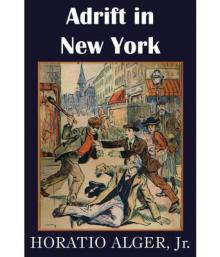 Adrift in New York: Tom and Florence Braving the World
Adrift in New York: Tom and Florence Braving the World Do and Dare — a Brave Boy's Fight for Fortune
Do and Dare — a Brave Boy's Fight for Fortune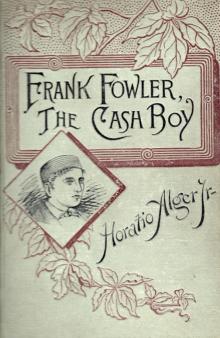 The Cash Boy
The Cash Boy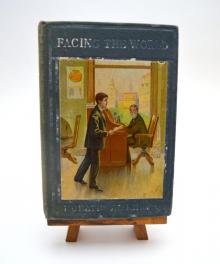 Facing the World
Facing the World The Young Explorer; Or, Claiming His Fortune
The Young Explorer; Or, Claiming His Fortune The Store Boy
The Store Boy Frank's Campaign; Or, The Farm and the Camp
Frank's Campaign; Or, The Farm and the Camp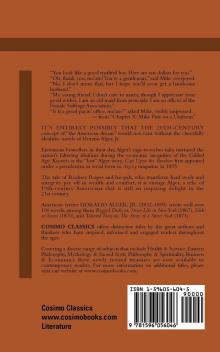 Cast Upon the Breakers
Cast Upon the Breakers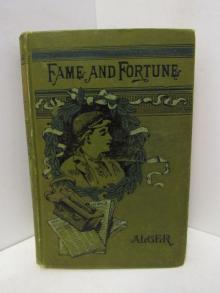 Fame and Fortune; or, The Progress of Richard Hunter
Fame and Fortune; or, The Progress of Richard Hunter The Errand Boy; Or, How Phil Brent Won Success
The Errand Boy; Or, How Phil Brent Won Success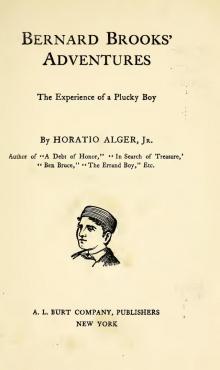 Bernard Brooks' Adventures: The Experience of a Plucky Boy
Bernard Brooks' Adventures: The Experience of a Plucky Boy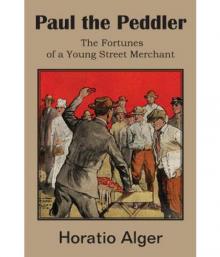 Paul the Peddler; Or, The Fortunes of a Young Street Merchant
Paul the Peddler; Or, The Fortunes of a Young Street Merchant Brave and Bold; Or, The Fortunes of Robert Rushton
Brave and Bold; Or, The Fortunes of Robert Rushton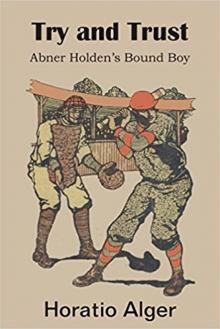 Try and Trust; Or, Abner Holden's Bound Boy
Try and Trust; Or, Abner Holden's Bound Boy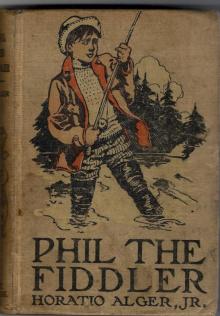 Phil, the Fiddler
Phil, the Fiddler In A New World; or, Among The Gold Fields Of Australia
In A New World; or, Among The Gold Fields Of Australia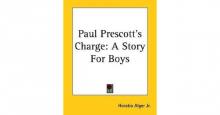 Paul Prescott's Charge
Paul Prescott's Charge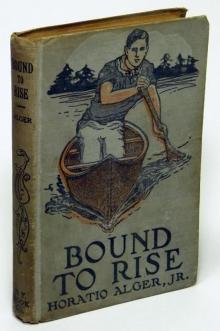 Joe's Luck; Or, Always Wide Awake
Joe's Luck; Or, Always Wide Awake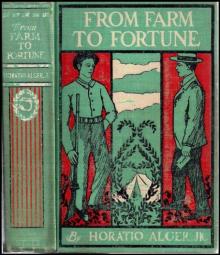 From Farm to Fortune; or, Nat Nason's Strange Experience
From Farm to Fortune; or, Nat Nason's Strange Experience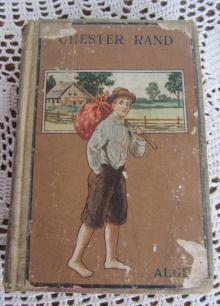 Chester Rand; or, The New Path to Fortune
Chester Rand; or, The New Path to Fortune Driven from Home; Or, Carl Crawford's Experience
Driven from Home; Or, Carl Crawford's Experience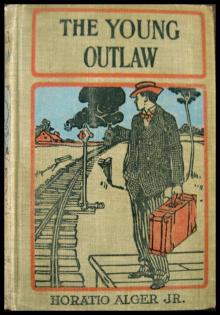 The Young Outlaw; or, Adrift in the Streets
The Young Outlaw; or, Adrift in the Streets Risen from the Ranks; Or, Harry Walton's Success
Risen from the Ranks; Or, Harry Walton's Success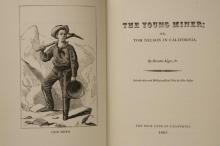 The Young Miner; Or, Tom Nelson in California
The Young Miner; Or, Tom Nelson in California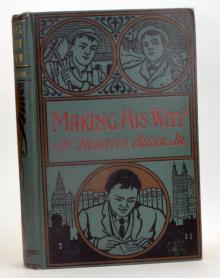 Making His Way; Or, Frank Courtney's Struggle Upward
Making His Way; Or, Frank Courtney's Struggle Upward Ben, the Luggage Boy; Or, Among the Wharves
Ben, the Luggage Boy; Or, Among the Wharves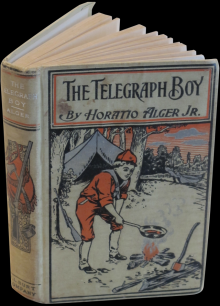 The Telegraph Boy
The Telegraph Boy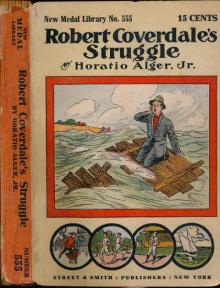 Robert Coverdale's Struggle; Or, on the Wave of Success
Robert Coverdale's Struggle; Or, on the Wave of Success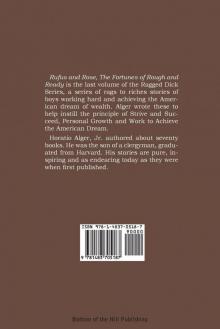 Rufus and Rose; Or, The Fortunes of Rough and Ready
Rufus and Rose; Or, The Fortunes of Rough and Ready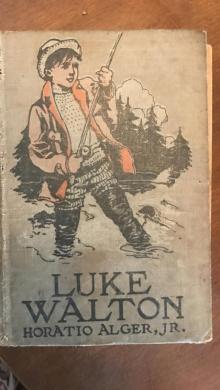 Luke Walton
Luke Walton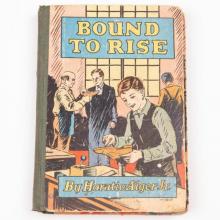 Mark Mason's Victory: The Trials and Triumphs of a Telegraph Boy
Mark Mason's Victory: The Trials and Triumphs of a Telegraph Boy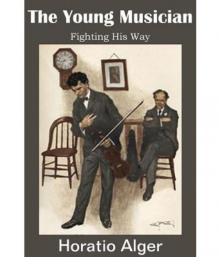 The Young Musician; Or, Fighting His Way
The Young Musician; Or, Fighting His Way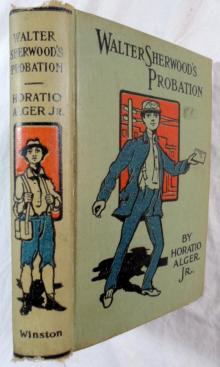 Walter Sherwood's Probation
Walter Sherwood's Probation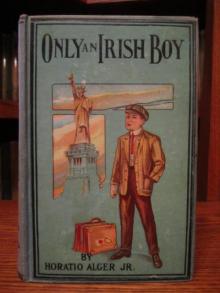 Only an Irish Boy; Or, Andy Burke's Fortunes
Only an Irish Boy; Or, Andy Burke's Fortunes Slow and Sure: The Story of Paul Hoffman the Young Street-Merchant
Slow and Sure: The Story of Paul Hoffman the Young Street-Merchant Herbert Carter's Legacy; Or, the Inventor's Son
Herbert Carter's Legacy; Or, the Inventor's Son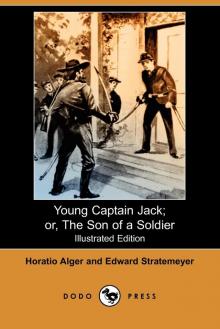 Young Captain Jack; Or, The Son of a Soldier
Young Captain Jack; Or, The Son of a Soldier Timothy Crump's Ward: A Story of American Life
Timothy Crump's Ward: A Story of American Life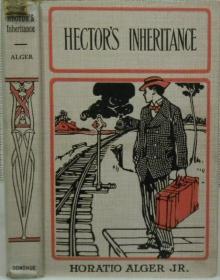 Hector's Inheritance, Or, the Boys of Smith Institute
Hector's Inheritance, Or, the Boys of Smith Institute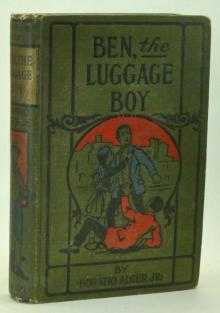 Ben's Nugget; Or, A Boy's Search For Fortune
Ben's Nugget; Or, A Boy's Search For Fortune